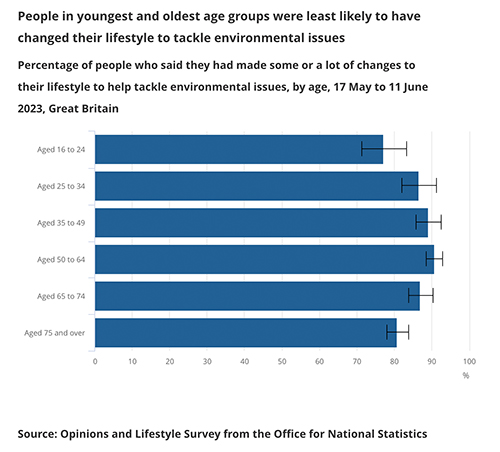The UK Measures of National Well-being track progress on a range of factors affecting people’s lives. New measures reflect people’s pro-environmental behaviours. For over a decade, the Office for National Statistics (ONS) has been collating data on well-being in order to measure progress in the UK. These UK Measures of National Well-being (UK MNW) include a wide range of information:
- about individuals, such as physical and mental health and working lives;
- about communities, such as people’s opinions on their local area;
- at a national level, including measures of the quality of our environment.
Events from the past decade, such as the pandemic, the UK’s exit from the EU, increasing public awareness of climate change and the rising cost of living have highlighted the continuing importance of many of the measures tracked, as well as new areas to improve the picture ONS are building. Since autumn 2022, ONS have reviewed their measures and added new ones to make sure that 10 years on, the data collected still reflects what is important to the UK today.
More than eight in ten (86.5%) adults in Great Britain report having made at least some changes to their lifestyle to help tackle environmental issues, according to responses to one of the new measures collected between May and June 2023.
This question was added to the UK Measures of National Well-being to help understand people’s behaviours and attitude towards the environment.
Over the short term, recycling rates (the percentage of household waste that is recycled) have declined from 46.0% in 2019 to 44.4% in 2020. However, the pandemic affected much of daily life in 2020, and ONS says it will need more data to understand if we are actually seeing a downward trend.
For the first time, ONS have asked people to report the extent to which they have made changes to their lifestyle to help tackle environmental issues. The majority of adults in Great Britain said they had made at least some changes.
- Seven in ten (73.6%) of people said they had made some changes, while one in ten (12.8%) said they had made a lot. A similar proportion of people (13.5%) said they had made no changes.
- Around nine in ten women (91.0%) reported having made some or a lot of lifestyle changes, compared with 81.7% of men.
- Adults aged 16 to 24 years were least likely to make lifestyle changes (77.2%) and adults aged 50 to 64 years had the highest rates of making lifestyle changes (90.7%).
Diane Crowe, Head of Group Sustainability, Reconomy, says that figures released by the ONS show how seriously consumers take the impact their lifestyle has on the environment, but the falling recycling rates show that we need to improve the infrastructure available to people that what to minimise their waste. She commented, “The UK lags behind the best in Europe when it comes to circularity, as over 90% of our economic activity is reliant on the consumption on virgin resources. However, today’s figures show we have an engaged and active population who want to adapt their lifestyle to live in an environmentally conscious way. Businesses are adapting to demands from consumers to be more considerate of their environmental legacy, but meaningful improvements in our overall circularity will require collaboration and investment from both industry and government to provided the national infrastructure we need to deliver meaningful change.”




